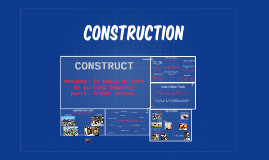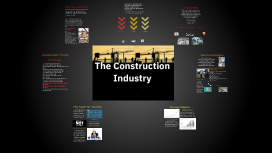Construction industry
Transcript: Injuries and risks Construction industry refers to the industrial branch of manufacturing and trade related to building, repairing, renovating, and maintaining infrastructures. Challenges Now that we have explored some of the career paths that the construction industry provides lets take a dive into the risks and posable injuries that the industry provides. Lets explore some career paths that the construction industry offers When working in construction not everything is going to go right all the time there are a bunch of things that need to go just right for a jobsite to function smoothly. List of challenges Common challenges 1. Slow technological adoption speed 2. Managing documentation 3. Issues with cash flow 4. The problem of “pointing fingers” 5. Irregular equipment maintenance/replacement 6. “Forgetful” clients 7. Keeping up with compliance regulations 8. Construction safety 9. Working on a schedule 10. Communication problems 11. Lack of a skilled workforce 12. Insufficient productivity 13. Issues with supply chains 14. Vandalism/theft on site 15. Lack of reliable subcontractors Construction saftey working on schedule Vandalism/theft Link If you work in construction you should know what your getting yourself into. When you are on the job site it might be fun to mess around because your bored but if your not careful you can get hurt bad. Ocean, James. “Top 15 Construction Problems & Industry Challenges in 2024.” Revizto, 7 February 2024, https://revizto.com/en/construction-issues-challenges/. Accessed 14 May 2024. Link Construction saftey Working on schedule Vandalism/theft Jones, Kendall. “Construction Risk Management.” ConstructConnect, 19 April 2024, https://www.constructconnect.com/blog/identifying-managing-construction-project-risks. Accessed 14 May 2024. While experience does matter, it is not uncommon for even the most knowledgeable of professionals to make mistakes when scheduling is managed manually. Common injuries in the feild. Theft and vandalism are issues that are not typically associated with the construction industry, but it is a problem that has existed for a long time and shows no signs of stopping. It is terrible for construction companies, since every missing or unusable piece of material decreases the overall margin of a project. The construction industry is well-known for its high risk of on-site injury. An essential part of any construction project is the stage where the building is physically created with the help of heavy machinery, weighty materials, and many construction workers. The nature of the work in the industry implies a significant possibility of an injury happening sooner or later. Solution Architect Roofer Drywaller Solution Solution This is one of many problems that modern technology and its advantages can solve partially or entirely. This can be prevented by calling muiltpule times and or talking to multiple people before hand and or just calling to make sure nothing has changed. Roofers install shingles, asphalt, metal, or other materials to make the roof weatherproof. Roofers make around 60k a year Being an architect is the highest paying job in the feild coming in at just a little under 100k a year. Becoming a drywaller is a pretty common job/career in the feild and it pays around 50k a year Fixing this problem requires some investments in regular surveillance equipment, such as fences, cameras, alarms, more lighting on-site, and more closed containers to store materials in. Things to expect as an architect Things to expect as an roofer Things to expect as an drywaller The best way to approach this is to adopt a more safety-focused attitude toward on-site work, investing more in protective equipment, safety training programs, and even safety protocols for when something happens or is about to happen. Architects plan and design buildings, whether for new construction, redevelopment or renovation. They have high-level design and drawing skills to create safe, functional and unique designs for projects of all sizes, like housing developments, libraries, airports just to name a few A roofer is a skilled trade worker who specializes in roof construction. They replace, repair or install the roof on nearly any type of architecture from single-family homes and garages to large-scale buildings, like hospitals, schools or shopping malls. A drywall finisher measures, cuts and sets drywall panels around mechanical structures, wall frames or other building elements and can create simple or ornamental surfaces through various application methods and tools. They apply the finish material and restore or maintain plaster or putty on partitions, ceilings and interior or exterior walls. Burns Electrocution Eye injury, including vision impairment or blindness Broken bones Knee and ankle injury Neck, shoulder or back injury Spinal cord injury, including damage that can cause paraplegia or quadriplegia Illnesses caused by toxic chemical exposure Head injury and/or brain injury.

















